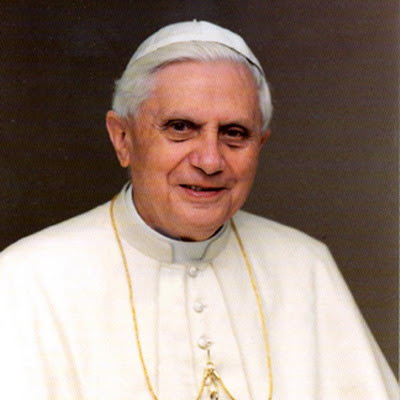 This one doesn't have the useful detail about how the Vatican works by Fr. Radcliffe (below), but contains other very commendable points.
This one doesn't have the useful detail about how the Vatican works by Fr. Radcliffe (below), but contains other very commendable points.In Defense of the Pope
by James Conley
First Things
Over these past few weeks a flurry of stories have appeared in the media regarding clergy sexual abuse and its mishandling by Catholic bishops and even the pope himself. Much of this information is dated. The fact that these stories were triggered in part by an attorney with a long and lucrative financial history of litigating the Catholic community and were pressed with such enthusiasm by editors during Holy Week—and in particular on Good Friday—could hardly have been a coincidence.
Sexual abuse of children cries to heaven for justice. It violates everything that is good and holy. It mocks everything Christ said in the gospels. Jesus compared the Kingdom of Heaven to the innocence of a little child. And for a Catholic priest to commit a crime and a sin like this is profoundly evil.
But sexual abuse is not uniquely or even predominantly a Catholic problem. It is a sickness widespread in our culture and also a global problem. Most studies indicate that in the United States as much as 60 percent of all sexual abuse of minors takes place within families.
It's certainly true that some Catholic priests perpetrated this evil on the innocent in years past. And too many Catholic bishops ignored or failed to grasp the gravity of this crime in addressing the problem. These men are gravely accountable to God for their actions.
But no other community or institution has examined itself on this painful issue as rigorously as the Catholic Church. No other group has put into place zero tolerance policies for sexual abuse and created safe environment programs like the Catholic Church in America, to the point where the Church is one of the most secure environments anywhere for children and young people.
And no person has done more to rid the Church of the evil of sexual abuse than the current successor of St. Peter, Benedict XVI. As archbishop of Munich thirty years ago, then as the Prefect for the Congregation for the Doctrine of the Faith and now as the Vicar of Christ, Pope Benedict has always been dedicated to his responsibilities of purifying the Church in this area.
I served as an official in the Vatican's Congregation for Bishops for ten years. In that capacity, I worked alongside then cardinal Joseph Ratzinger who was a member of our Congregation. During my last year in Rome I served under the same good man after his election as pope. I learned from direct, first-hand experience that Benedict XVI is truly a man of God, a gift to the Church and a shepherd after the heart of the Good Shepherd.
Benedict XVI named me a bishop in April 2008. As a brother bishop to the bishop of Rome, it pains my heart and should wound the heart of all Catholics, to see the vindictive way he has been treated in the media. The editorial cartoons, the opinion pieces, the vicious attacks on his person and reputation, the disinformation and twisting of facts—all these abuses against responsible press freedom have been repugnant.
No other world religious leader, Jewish, Muslim or other, would be treated in this way. Contempt for the Catholic Church—and don't be fooled; the contempt is directed not just at Church leaders, but at ordinary believers as well—no matter how vulgar or bitter, is the last acceptable prejudice. Why? Because the Catholic Church is one of the few remaining voices that speaks effectively against the moral confusion of our day. The Catholic faith does not and will not bless the damaging moral path some people now seem to prefer.
Let me close with the words of Benedict from his Holy Thursday Chrism Mass in Rome:
"I am always struck by the passage in the Acts of the Apostles which recounts that after the Apostles had been whipped by order of the Sanhedrin, they "rejoiced that they were counted worthy to suffer dishonor for the name of Jesus" (Acts 5:41). Anyone who loves is ready to suffer for the beloved and for the sake of his love, and in this way he experiences a deeper joy. The joy of the martyrs was stronger than the torments inflicted on them."
Discipleship involves suffering. But suffering does accomplish a powerfully good thing: It clarifies who is willing to suffer for Christ's Church and her mission, and who is not.
James D. Conley is auxiliary bishop of Denver.

No comments:
Post a Comment